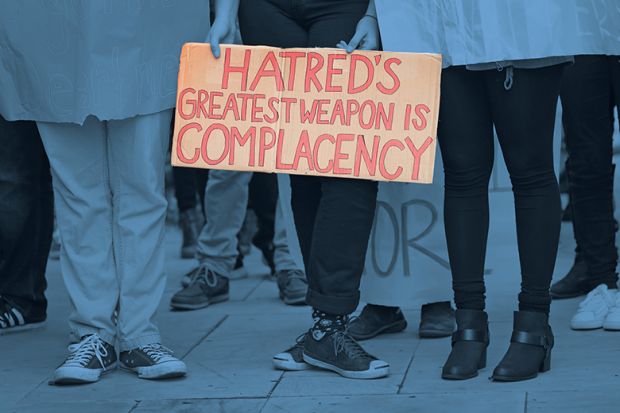With the start of a new academic year just weeks away, universities are again promoting the multiple mental health initiatives they provide to support students.
Unfortunately, experience has taught me that such support can be exploited in alarming ways. Although I have always encouraged students to make use of any help available, I am equally of the view that mental health issues do not excuse what is often simply bad behaviour, which can be ruinous to the welfare of others in the university, most notably its staff.
My own story includes a period of one year in which I was the subject of malicious allegations by a white female student known to be suffering from mental health problems. The initial concern arose when she began making baffling connections between lecture slides and Donald Trump while simultaneously making outrageous complaints about me – a British female academic from an Indian background. Initially, I was sympathetic towards her and inclined to not take things personally even though her claims were evidently untrue.
At the same time, the student had struck up a friendly rapport with (the all-white) senior management. With them, she was polite and markedly courteous, and she could rely on them fully to grant her extensions on assessments whenever she needed (which was all the time). This was coupled with the ongoing support that she was receiving from the university’s well-being team.
In subsequent months, the student’s accusations against me escalated. Her nonsensical claims were also accompanied by clearly racist comments and behaviour. Did this situation arise as a symptom of her obviously distressed state of mind? That would be a highly charitable view. But whatever duty of care that universities have towards students, there must come a point at which we need to draw a sharp line between mental health issues and what is unquestionably outrageous behaviour. Put simply, universities have a duty to demonstrate that racism will not be tolerated, even if it is a symptom of mental ill health.
This summer, The Guardian published a hard-hitting series of articles highlighting the failures of universities to tackle racism. Testimonials of mistreatment endured by ethnic minority academics contained the usual vocabulary: “discrimination”, “racial harassment”, “bullying”. There was no mention of the impact that racism has on the mental health of ethnic minority staff. Tales of the toll exacted on the mental health of staff in academia seem to surface in the news only when they relate to excessive workloads, precarious job positions or performance management. There is scant attention given to the fact that some university staff can find themselves in far more vulnerable positions than others.
As the only female permanent lecturer of a minority ethnic background, I was certainly aware of just how vulnerable I was. I had hoped that my reputation within my law department would have helped to protect me; I had been nominated for lecturer of the year and had won acclaim within the wider university for my efforts to enhance student engagement and inclusivity in the classroom. But the desire to excuse this student’s shameful behaviour meant that at no point did my managers explain to her that racism would not be tolerated under any circumstance.
My experience of student harassment and the department’s unwillingness to tackle it head-on was both demeaning and distressing. Despite what the university’s policies might suggest, no steps were taken to assure me that I, as a member of staff, had the right to work in an environment that was free of harassment, including from students. Equally disturbing for me was witnessing the ways in which staff protection was prioritised only when it concerned white members of staff. For example, when an altercation arose between a white male colleague and a black male student, the focus was on what more could be done to protect staff; no consideration was given to the ways in which the student himself had felt aggrieved or to his claims to having been subjected to racism from other white staff just days earlier.
Perhaps in hindsight I should have expected this because the warning signs had been there all along. On one occasion, a white female colleague of mine, who specialised in law enforcement and policing, went as far as showing her reluctance to address the student’s racism. Sitting in a staff meeting, the colleague casually revealed that she had received from the student an email expressing racist opinions against minority ethnic men (same ethnicity as me) and had chosen to delete the message instantly rather than report it.
If senior management in universities are reluctant to tackle racism, that attitude then filters down to rank-and-file staff, who in turn feel no discomfort or unease in admitting to others their unwillingness to address racist behaviour and language, that makes you only too aware that there is something very seriously wrong with the culture of that institution. And no amount of training workshops on unconscious bias or diversity will be of help to a university that works so relentlessly to avoid addressing the problems that exist inside it.
Universities need to ensure that all staff are well supported and are never put in a position where they must witness senior management excusing the bad behaviour of a student to the detriment of an employee’s own well-being. In the end, what my workplace taught me was that some people’s race, gender and mental health matters – just not mine.
The author is an academic at a UK university who has asked to remain anonymous.
POSTSCRIPT:
Print headline: No racism. No excuse
Register to continue
Why register?
- Registration is free and only takes a moment
- Once registered, you can read 3 articles a month
- Sign up for our newsletter
Subscribe
Or subscribe for unlimited access to:
- Unlimited access to news, views, insights & reviews
- Digital editions
- Digital access to THE’s university and college rankings analysis
Already registered or a current subscriber?




